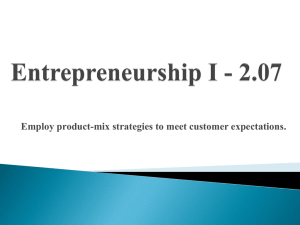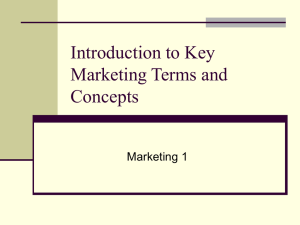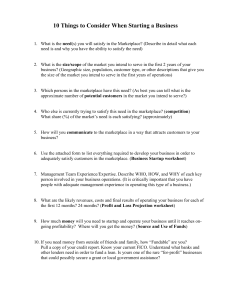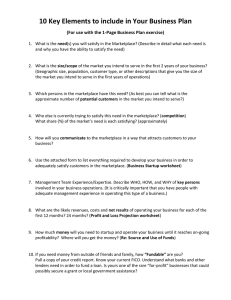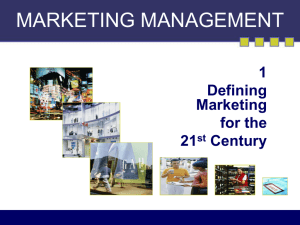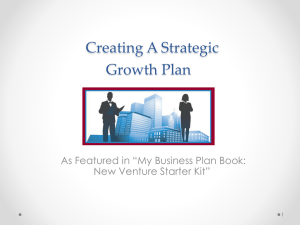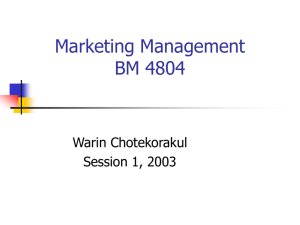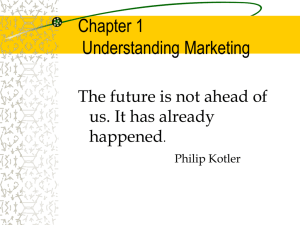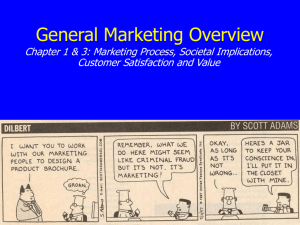Intro-Core Marketing Concepts
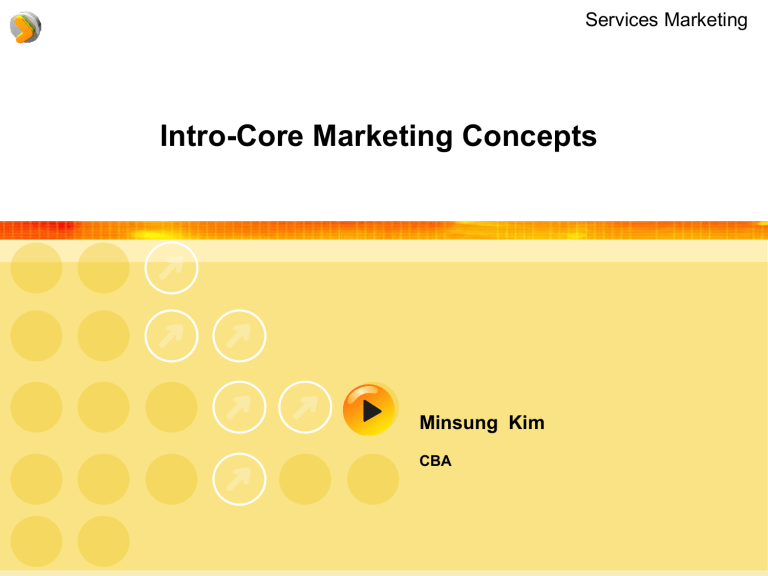
Services Marketing
Intro-Core Marketing Concepts
Minsung Kim
CBA
Marketing Defined
•Kotler’s social definition:
“Marketing is a societal process by which individuals and groups obtain what they need and want through creating, offering, and freely exchanging products and services of value with others.”
•The AMA managerial definition:
“Marketing is the process of planning and executing the conception, pricing, promotion, and distribution of ideas, goods, and services to create exchanges that satisfy individual and organizational objectives.”
What Can Be Marketed?
•Goods
•Services
•Experiences
•Events
•Persons
•Places
•Properties
•Organizations
•Information
•Ideas
Core Marketing Concepts
•Target markets and market segmentation
•Marketplace, market-space, metamarkets
•Marketers & prospects
•Needs, wants, demands
•Product offering and brand
•Value and satisfaction
•Marketing channels
•Supply chain
•Competition
•Marketing environment
•Marketing program
Core Marketing Concepts
•Target markets & segmentation
Differences in needs, behavior, demographics or psychographics are used
to identify segments.
The segment served by the firm is called the target market.
The market offering is customized to the needs of the target market.
•Shopping can take place in a:
Marketplace (physical entity, E-Mart)
Marketspace (virtual entity, G Market)
•Metamarkets refer to complementary goods and services that are related
in the minds of consumers.
Core Marketing Concepts
•Needs, Wants, and Demands
Needs describe basic human requirements such as food, air, water, clothing,
shelter, recreation, education, and entertainment.
Needs become wants when they are directed to specific objects that might
satisfy the need. (Fast food)
Demands are wants for specific products backed by an ability to pay.
A Product is any offering that can satisfy a need or want, while
a brand is a specific offering from a known source.
Understanding customer needs and wants is not always simple
(stated needs; real needs; unstated needs; delighted needs; secret needs)
Core Marketing Concepts
•Value and Satisfaction
When offerings deliver value and satisfaction to the buyer, they are successful
Value reflects the sum of perceived tangible and intangible benefits and costs to the customers
Satisfaction reflects a person’s comparative judgment of a product’s perceived performance in relation to expectation
•Marketing Channels - Communication channels
Deliver messages to and receive messages from target buyers.
Includes traditional media, non-verbal communication, and store atmospherics.
•Marketing Channels - Distribution channels
Display or deliver the physical products or services to the buyer / user.
•Marketing Channels - Service channels
Carry out transactions with potential buyers by facilitating the transaction.
Core Marketing Concepts
•A supply chain stretches from raw materials to components to final products
that are carried to final buyers.
•Each company captures only a certain percentage of the total value
generated by the supply chain.
•Four levels of competition can be distinguished by the level of
product substitutability:
Brand competition
Industry competition
Form competition
Generic competition
Core Marketing Concepts
•The following forces in the broad environment have a major impact on
the task environment:
Demographics
Economics
Natural environment
Technological environment
Political-legal environment
Social-cultural environment
•The marketing program is developed to achieve the company’s objectives.
Marketing mix decisions include:
Product: provides customer solution.
Price: represents the customer’s cost.
Place: customer convenience is key.
Promotion: communicates with customer.
Company Orientations toward the Marketplace
•The orientation or philosophy of the firm typically guides marketing efforts.
Several competing orientations exist:
Production concept
Product concept
Selling concept
Marketing concept
The holistic marketing concept
•Achieving organizational goals requires that company be more effective than competitors in creating, delivering, and communicating customer value.
•Four pillars of the marketing concept:
Target market
Customer needs
Integrated marketing
Profitability
Company Orientations toward the Marketplace
The holistic marketing concept
